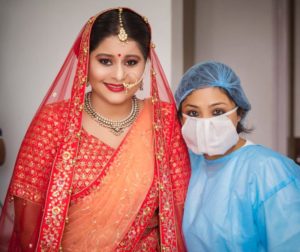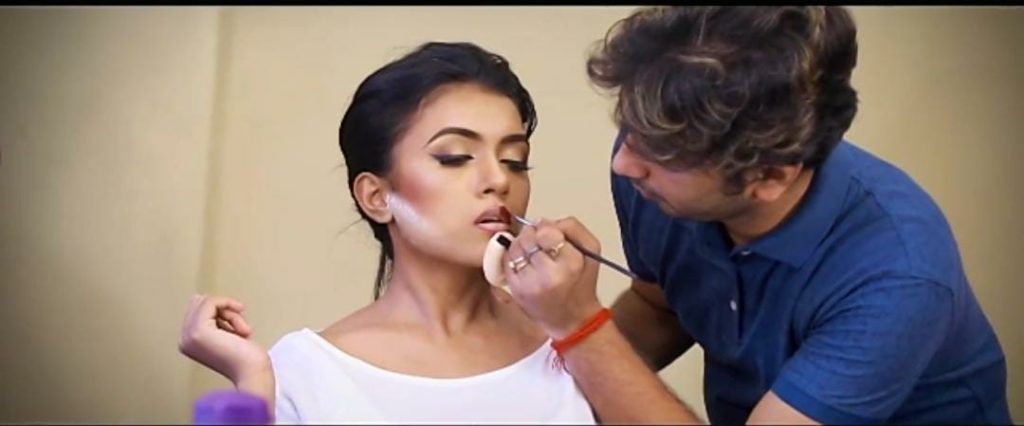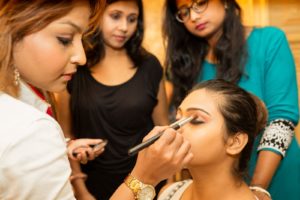Covid-19 leads to unmaking of make-up artists

Before the pandemic, bridal makeup was one of the fastest growing markets for makeup artists like Namrata Chakraborty (wearing PPE kit) due to large number of weddings. However, even this segment is also under pressure now (Photo credit: Saptadip)
Though many sectors of the economy have been hit by the coronavirus pandemic, make-up artists say they have been hit hard and face mounting losses even after lockdown.
‘‘For me, make-up is an art. It is my passion. So, I cannot take it lightly. But the coronavirus pandemic has shattered the industry and our worth as artists. I have worked on a couple of weddings post lockdown. But, now the clients ask me why I am charging so much. People are negotiating as if I am not a makeup artist but a vegetable seller. That is one mental pressure that we artists are going through. We have lost the basic dignity because of this pandemic and of course we can’t blame anybody,’’ Shambo Bhadra, a Kolkata based professional makeup artist and hairdresser who has been practicing his art in India for nearly a decade, tells Media India Group.
Just as there is a pre-covid and post-covid with every aspect of the economy today, the pandemic has also become a defining moment for the make-up artists in the country, who say that they have been hit even harder than practically any other sector. The impact is multi-fold and could stretch several months, if not years, after the lockdown has been lifted.
‘‘Before lockdown, business was as usual and I had big plans. But the lockdown made everything lopsided and it was perhaps the worst thing that could have ever happened to any industry. We just came to a full stop. Before the lockdown it was promising, during the lockdown it came at a standstill and I don’t know what comes next,’’ says Bhadra.
Bhadra did reasonably well last year. From November 2018 to May 2019, his revenues were in the range of INR 700,000-1 million. But in 2020, he says he would be lucky to get to around INR 400,000, adding that he had already lost around INR 250,000 during the three months of lockdown and that, too, just for the wedding segment. ‘‘The other projects, I am not even thinking about it or calculating the losses. We really don’t know when we can recover the loss,’’ he says.
‘‘For the first three months, when the lockdown was full, I could do nothing. Weddings are a big activity for us and I had several bookings for weddings during the preceding three months. However, they were all cancelled. Now, some of the weddings are taking place, but people, even the rather well-to-do ones are driving a hard bargain with me,’’ says Bhadra.
The make-up artists are feeling squeezed at both the ends. On the one hand, the customers are driving hard, often ridiculous bargains and on the other, the artists say their costs have risen, mainly due to the pandemic and the safety precautions that they need to take, leading to a serious impact on their net incomes.

Applying makeup is a passion, art & and a profession that Shambho Bhadra has been practising for nearly decade with clients all over India (Photo credit: Shambo Bhadra)
‘‘The expenditure has doubled while doing makeup now. Earlier we used to use 2-3 sponges for each session, but now it has gone up to six. Same is the case with other tools used by us. Also, now we have to bear the additional cost of sanitisers and PPE kits. Also, not every product we can take out from a container and apply. Some are solid so we have to cut certain amount from it and then reuse the rest. So, we are wasting a lot of product. We have also changed the makeup application techniques and now we don’t come in direct contact with clients’ skin, but we need to touch the skin to assess if it’s dry skin or oily. But with the gloves, it has become difficult to assess this and made our work more time consuming, riskier and with a lot of product loss per session. So, the costs have doubled for me in every way and on top of that the clients are bargaining, making it a twin-edged attack on our incomes,’’ he complains.
Bhadra is hardly alone in his misery. Namrata Chakraborty is another popular make-up artist in Kolkata who used to draw customers from all over the metropolis and the bulk of clientele came from the rich Marwari families. She says that while during the lockdown most of the weddings have fizzled out, postponed or done almost privately, even for the ones are now being organised the customers are driving a hard bargain. ‘‘We are celebrity makeup artists. We charge INR 18,000-20,000 for two hours. Now they are saying that can you please do our make-up for INR 5,000 as half of our face will be covered in mask, ’’ Chakraborty tells Media India Group.
She says due to the pandemic, she is scared to use expensive make up products on clients who want to get their makeup done at INR 5,000 and therefore for those clients she has switched to other brands as a cost cutting measure as well as a matter of prudence. ‘‘We are scared to use the branded products. We are not ready to use a Chanel palette that costs us INR 8,000-9,000 for people who want to get their make-up done at INR 5,000. So, we have purchased palettes from other brands that we can use specially on those clients. In this way even if the person on whom it is being used is infected we can throw it after a single use so that we are safe and so are our customers,’’ she adds.
Getting make-up material is also a big challenge now as the distribution network has been seriously disrupted and even the product manufacturers have not yet fully restarted their operations, leading to shortage of certain popular products and sending their prices shooting up, as a result and hurting the make-up artists further. Bhadra says that he does not get supplies from brands like Sephora or Mac any more since the lockdown, while Chakraborty says that the sale of fake or imitation products has gone up over the last three months, especially in the digital universe. ‘‘When it comes to buying products online, since we can’t find most of the products in shops, we are not sure if it’s the original product. Because sometimes the pigments stay and sometimes they don’t,’’ she says.
Even though the lockdown was eased over six weeks ago, Bhadra says that the pandemic looks likely to continue to bite him for several months more, for much after the lockdown is completely lifted.
‘‘As freelancers what we do is we take up an advance and we block a date. But since the outbreak, many of the dates for which I was booked have come and gone, but we have not been paid and if in some cases, the wedding is postponed to, say December, I am bound to do that because I already have taken an advance. But then it doesn’t make sense as I am blocking two different dates. There are some weddings that I don’t know when they will take place,’’ he says.
Chakraborty runs a beauty salon and a training academy at Tollygunge, a popular locality in Kolkata. She reopened the saloon on June 8, once the government allowed hair and beauty salons to restart. Unfortunately for her she is yet to receive the first customer since reopening, almost a month after having reopened.

To effectively impart training to budding make-up artists, it is critical that the trainer, the model & the trainees are in close proximity to each other, which is not feasible during the pandemic (Photo credit: Namrata Chakraborty)
She says that one of the best ways to convince customers to go for make-up was when they looked at her own makeup. ‘‘We cannot market ourselves now. When you are presentable half of the people look at you and ask who did your make-up. But now we are covered from head to toe,’’ she says.
Another long-term impact on make-up artists could be a serious drop in interest among the youth in adopting it as a career. Chakraborty has an academy for running certification courses aimed at training budding make-up artists. She says she has seen the interest level for make-up as a career drop dramatically amongst students since the pandemic hit and lockdowns announced.
‘‘Earlier people were crazy to learn about make-up but now they see no future in it. They say that now we think we need to change our careers. And even for online courses, they say that they can learn it for free by watching YouTube, instead of paying to enroll in an academy. But they don’t realise that make-up is all about colours and precise shades of colours. A metallic shade, for instance, cannot be replicated online as the quality of cameras and lighting is not very good and hence it’s impossible to explain to someone the difference between two shades of the same colour in an online course,’’ she says. Another, equally big challenge for the academy is that in the absence of reliable public transport services most of the students are facing difficulty in commuting to the academy. ‘‘However, there are students who manage to show up for every single class,’’ she adds.
Though Bhadra does not run any academy or fixed training programmes, he says there were students who wanted to train under him. ‘‘But I was really never interested in training people because I felt like I needed more training myself. But all my assistants were training under me and I made sure they paid me very meagre amount because they were all needy. I have two institutes where I go and teach but at a very meagre payment. This I don’t do because I will get to earn, but I will get to help other people,’’ he says.
Vis a vis online training that has caught on across the world during the pandemic, Bhadra says he was never at ease with digital training. ‘‘As an artist, I am not someone who is very much acquainted to this technological stuff. There are certain things as an artist that I was taught that students learn only when they are close to you and the model on whom you work. On a virtual medium it becomes very difficult. It looks very fancy but in 7-10 months they actually realise that they have not learnt anything. But yes I welcome a lot of people for one to one personal classes and lot of them turn up. I also gave individual grooming classes during the lockdown and I would not say I made a lot of money but yes I made money to survive. Before lockdown these people were too busy with their office but during lockdown they wanted to learn so I gave one to one classes. It was digital and very specified to that person only,’’ he says.
Over the long-term, the demand for make-up in India is bound to keep increasing, it is in the short-term that make-up artists need to see how they can make-up for lost business. Indeed, they may need to apply a few more coats before their sector can recover its former glow.









